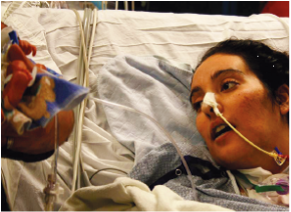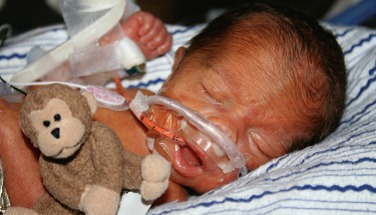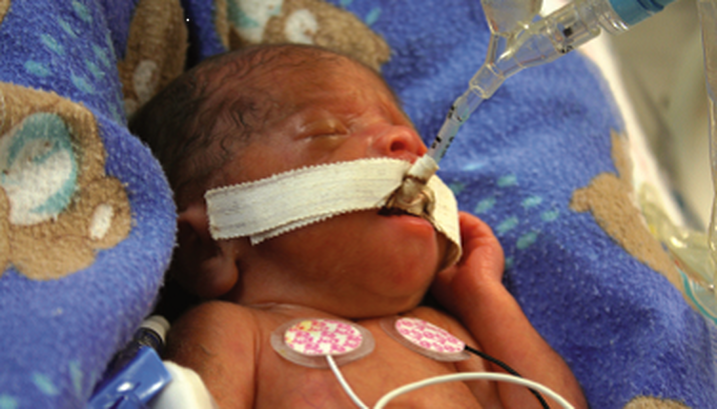 Noah Matthew was born on a rainy winter day in 2009, Pearl Harbor Day to be exact. We jokingly surmise that it was Noah’s way of warning us that it would most definitely be, ‘a day that would live in infamy’ for more reasons than one. My pregnancy and Noah’s birth were not like many others of his preemie friends. I, of course, did what any neurotic first-time mother does, including making a playlist of songs I would like playing in the delivery room, putting headphones on my tummy with Mozart blasting to aid his brain development, reading every single pregnancy book, and anxiously awaiting the arrival of our first child. Our plans took a tailspin at the end of October 2009 when I contracted the deadly H1N1 flu (swine flu) at 24 weeks pregnant. After a very unfortunate initial misdiagnosis at a local urgent care facility only a couple days after the onset of symptoms, I entered the hospital emergency room, and, unbeknownst to me, was already in very critical condition. After being rushed back to triage and following a flurry of activity that included multiple IV lines, a breathing mask, and several medications, my vitals continued to decline. The doctors instructed my husband and me that it was in my and our baby’s best interest to be placed in a medically induced coma for a couple days to allow my body to get some rest and not work so hard to breathe. A couple days turned into weeks, and I woke up almost two months later as a new mom to a very tiny preemie baby. Over the course of six weeks, I was on a ventilator, got a massive blot clot, went into renal failure, and eventually had to have a tracheotomy placed to help me breathe on my own. As I began to wake up from being weaned from the paralytics, Noah started experiencing heart decelerations, and the decision was made to deliver him via emergency C-section at 29 weeks and five days gestation. I regained full consciousness the evening following his birth. With the help of my husband and our nurses (and with my arms being propped up on pillows because my body was so atrophied from lack of movement for almost two months), I was able to ‘hold’ my son. That was and always will be one of the best moments of my life. Noah spent the next three months in the NICU, dealing with issues ranging from a close call with NEC (necrotizing enterocolitis), lung and breathing issues requiring extreme oxygen support, Gastroesophageal reflux disease (GERD), ROP (retinopathy of prematurity), growth issues, anemia, which required several transfusions, as well as hernia repair surgery in his umbilical and groin areas. In comparison, our journey in the NICU was, for the most part, uneventful when you think about everything Noah endured while in utero. He was exposed to drugs that could have made it impossible to survive, or at the very least cause brain damage. I never thought there would come a day when I would ever say that I was thankful I went into complete renal failure, but I am because my blood was being cycled out of my body and scrubbed clean 24 hours a day, seven days a week. Because of this, Noah received only very residual amounts of those toxic drugs. The post-traumatic stress I experienced in dealing with my own mortality and subsequent paralysis in my right foot, made things that much more stressful and still stays with me in some ways today. I had to struggle with the notion that I was no longer this strong, independent, capable person I had been before. Instead, I counted my blessing as I sat in a wheelchair beside my son’s incubator. And again when I held onto a walker to be able to watch my husband change my little two-pound son’s diaper. How would I ever be able to take care of this fragile human being who depended on me for his life when I could barely take care of myself? You sit there in a room with beeping monitors and flashing numbers on a screen that act as a constant reminder that your tiny little baby is not like all the others. One of the most difficult things in the NICU is seeing other babies and their parents who got there after you did leave before you. I can’t tell you how many times I looked over at my husband and thought, “Why not us?” Our chance of survival was less than 10 percent, but we were able to defy the odds. With the help of modern medicine, through many prayers, and by the grace of God, we became miracles. To say that I have learned to look at life and tough situations very differently would be an understatement. Despite all the anxiety, fear, and sadness, we experienced the most special and rewarding memories. The relationships and bonds we made with the nurses, doctors, and fellow NICU parents are as strong as they were all those years ago. We don’t take things like our health and waking up every day for granted anymore. We know, beyond the shadow of doubt, that the miracle of birthing a healthy child is a blessing. And most of all, we are so very thankful for all the nurses and doctors and organizations like Miracle Babies who were there for us during one of the scariest times of our lives. If there is a support group you can join, or a way you can give back to those in the shoes you filled not so long ago, I encourage you to reach out and do something. Miracle Babies has afforded us opportunities to do just that. There is no way to be able to say thank you enough. We are forever indebted to them and the wonderful life they breathe into this community and this family of NICU warriors. Veronica Pacheco Abstract taken from “Miracle Babies guide and journey though the NICU.” Written by: Sean Daneshmand, MD and Susan Newman, MSN, RN, NNP-BC Comments are closed.
|


 RSS Feed
RSS Feed